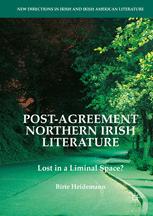

Most ebook files are in PDF format, so you can easily read them using various software such as Foxit Reader or directly on the Google Chrome browser.
Some ebook files are released by publishers in other formats such as .awz, .mobi, .epub, .fb2, etc. You may need to install specific software to read these formats on mobile/PC, such as Calibre.
Please read the tutorial at this link: https://ebookbell.com/faq
We offer FREE conversion to the popular formats you request; however, this may take some time. Therefore, right after payment, please email us, and we will try to provide the service as quickly as possible.
For some exceptional file formats or broken links (if any), please refrain from opening any disputes. Instead, email us first, and we will try to assist within a maximum of 6 hours.
EbookBell Team

4.4
32 reviewsThis book uncovers a new genre of ‘post-Agreement literature’, consisting of a body of texts – fiction, poetry and drama – by Northern Irish writers who grew up during the Troubles but published their work in the aftermath of the Good Friday Agreement. In an attempt to demarcate the literary-aesthetic parameters of the genre, the book proposes a selective revision of postcolonial theories on ‘liminality’ through a subset of concepts such as ‘negative liminality’, ‘liminal suspension’ and ‘liminal permanence.’ These conceptual interventions, as the readings demonstrate, help articulate how the Agreement’s rhetorical negation of the sectarian past and its aggressive neoliberal campaign towards a ‘progressive’ future breed new forms of violence that produce liminally suspended subject positions.